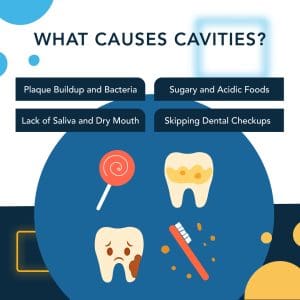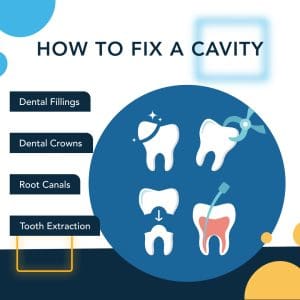Cavities are one of the most common dental concerns, but they are largely preventable with proper oral care. Maintaining healthy teeth requires a combination of good daily habits, regular dental visits, and a balanced diet. Understanding what causes cavities and how to prevent them can help you avoid unnecessary dental treatments and protect your long-term oral health. In this article, we will explore the most effective strategies to prevent cavities and keep your smile healthy and strong.
What is a Cavity?
A cavity is a permanently damaged area in the enamel, the outer layer of your tooth, that develops into a small hole or decay. Cavities form when bacteria in the mouth produce acids that erode the enamel, often as a result of poor oral hygiene, frequent snacking, or consuming sugary foods and drinks. If left untreated, cavities can lead to pain, infection, and more serious dental issues. Understanding how cavities develop is the first step in preventing them and maintaining strong, healthy teeth.
What Causes Cavities?
Cavities develop when harmful bacteria in the mouth produce acids that weaken tooth enamel. This process, known as tooth decay, is influenced by several factors, including diet, oral hygiene habits, and saliva production. When plaque builds up on the teeth and is not properly removed, it creates an ideal environment for decay to progress. While cavities are common, they are also largely preventable with the right care. Understanding the key factors that contribute to tooth decay can help you take proactive steps to protect your smile.
Plaque Buildup and Bacteria
Plaque is a sticky film of bacteria that constantly forms on the surface of your teeth. When sugars and starches from food interact with plaque, bacteria produce acids that weaken tooth enamel. If plaque is not removed through proper brushing and flossing, it hardens into tartar, making it even easier for cavities to develop and spread.
Sugary and Acidic Foods
Frequent consumption of sugary and acidic foods creates an ideal environment for cavity formation. Sugar feeds harmful bacteria in the mouth, leading to increased acid production that erodes enamel. Acidic foods and beverages, such as citrus fruits and soda, further weaken the enamel, making teeth more vulnerable to decay. Moderation and proper oral care can help reduce these effects.
Poor Oral Hygiene Habits
Neglecting daily oral care increases the risk of cavities. Failing to brush and floss regularly allows plaque and bacteria to accumulate, leading to enamel erosion and tooth decay. Inconsistent oral hygiene can also contribute to gum disease, which may further impact overall dental health. Establishing a thorough and consistent routine is essential for preventing cavities.
Lack of Saliva and Dry Mouth
Saliva plays a crucial role in protecting teeth by washing away food particles and neutralizing acids. When saliva production decreases due to dehydration, certain medications, or medical conditions, the risk of cavities increases. A dry mouth allows bacteria to thrive, which accelerates enamel breakdown. Staying hydrated and addressing dry mouth symptoms can help maintain oral health.
Poor Brushing and Flossing Techniques
Even if you brush and floss regularly, improper techniques can leave plaque and food debris behind. Brushing too hard, using the wrong toothbrush, or neglecting certain areas of the mouth can lead to uneven cleaning. Likewise, ineffective flossing may not remove plaque from between teeth. Learning and practicing proper techniques ensures more effective cavity prevention.
Skipping Regular Dental Checkups
Routine dental visits are essential for early detection and prevention of cavities. Professional cleanings remove hardened plaque (tartar) that cannot be eliminated with regular brushing. Dentists also identify early signs of decay before they worsen, helping to prevent more extensive dental treatments. Skipping checkups increases the risk of undetected cavities, which leads to potential pain and complications.
How Do You Prevent Cavities?
Preventing cavities starts with a combination of good oral hygiene, healthy dietary choices, and regular dental care. By taking proactive steps to protect your teeth, you can reduce the risk of decay and maintain a strong, healthy smile. Understanding the key habits that support oral health will help you prevent cavities before they start. In the following sections, we will explore the most effective techniques for keeping your teeth cavity-free.
Brushing and Flossing Properly
Brushing twice a day with a fluoride toothpaste and flossing daily are essential for cavity prevention. Proper brushing removes plaque and food particles from the tooth surface, while flossing cleans between teeth where a toothbrush cannot reach. Using gentle, circular motions and ensuring thorough coverage helps protect enamel and maintain healthy gums.
Using Fluoride for Enamel Protection
Fluoride strengthens enamel and makes teeth more resistant to decay. It is found in most toothpastes, mouthwashes, and public water supplies. Regular use of fluoride helps repair early signs of tooth decay before they become cavities. For additional protection, professional fluoride treatments from a dentist can provide extra reinforcement for those at higher risk of cavities.
Eating a Tooth-Friendly Diet
A balanced diet rich in vitamins and minerals supports strong teeth and gums. Foods high in calcium, such as dairy products and leafy greens, help reinforce enamel, while crunchy fruits and vegetables stimulate saliva production, which naturally cleanses the mouth. Choosing nutritious, whole foods over processed snacks can significantly lower the risk of cavities.
Avoiding Excess Sugar and Acidic Foods
Limiting sugary and acidic foods is key to preventing cavities. Sugar fuels harmful bacteria that produce enamel-eroding acids, while acidic foods and drinks weaken tooth surfaces. Reducing consumption of candy, soda, and citrus-heavy foods, and rinsing with water after eating them, can help minimize their impact on oral health and protect against tooth decay.
How to Fix a Cavity
Once a cavity has formed, it will not heal on its own and requires professional dental treatment. The type of treatment depends on the severity of the decay, ranging from simple fillings to more advanced procedures like root canals or extractions. Addressing cavities early can prevent further damage and preserve the health of your teeth. Below are the most common treatments used to repair cavities and restore tooth function.
Dental Fillings
Fillings are the most common treatment for cavities, especially in their early stages. During the procedure, the dentist removes the decayed portion of the tooth and fills the space with a durable material, such as composite resin, amalgam, or porcelain. Fillings restore the tooth’s structure and function, preventing further decay and protecting it from future damage.
 Dental Crowns
Dental Crowns
When a cavity is too large for a filling but the tooth can still be saved, a dental crown may be recommended. A crown is a custom-made cap that covers the damaged tooth, restoring its strength, shape, and function. Made from materials like porcelain or metal, crowns provide long-term protection and prevent further deterioration of the affected tooth.
Root Canals
If decay reaches the inner pulp of the tooth, where nerves and blood vessels are located, a root canal may be necessary. This procedure involves removing the infected pulp, cleaning the inside of the tooth, and sealing it to prevent further infection. A crown is usually placed afterward to restore strength and functionality, helping to save the natural tooth.
Tooth Extraction
In cases where a tooth is severely decayed and cannot be saved, extraction may be the best option. Removing the damaged tooth prevents infection from spreading to surrounding teeth and gums. Depending on the location and function of the extracted tooth, replacement options such as dental implants, bridges, or dentures may be recommended to restore oral function and aesthetics.
When to See a Dentist for Cavity Concerns
Recognizing the signs of a cavity early can prevent more serious dental issues down the line. While routine dental checkups help catch cavities before they worsen, certain symptoms indicate the need for immediate attention. If you notice any of the following warning signs, scheduling a dental visit as soon as possible can help protect your teeth and overall oral health.
Visible Holes or Dark Spots on Teeth
If you notice small pits, holes, or dark spots on your teeth, it could be a sign of decay. These visible changes indicate that the enamel has been weakened and a cavity has started to form. Early detection and treatment with a filling or fluoride application can prevent the decay from spreading and causing more extensive damage.
Sensitivity to Hot, Cold, or Sweet Foods
Increased sensitivity to hot, cold, or sugary foods can be an early indicator of a cavity. When enamel wears down, it exposes the underlying dentin, making teeth more vulnerable to temperature changes and sweet foods. If sensitivity persists or worsens, it is essential to see a dentist to determine the cause and prevent further deterioration.
Swelling or Pus Around a Tooth
Swelling, pus, or a small bump on the gums near a tooth could signal an infection caused by an untreated cavity. This may indicate an abscess, which can be painful and potentially lead to serious complications if left untreated. Immediate dental care is necessary to address the infection and prevent it from spreading to other areas of the mouth or body.
Pain That Won’t Go Away
A lingering toothache or sharp pain when biting down may suggest that a cavity has reached the inner layers of the tooth. Persistent discomfort should not be ignored, as it often indicates advanced decay that requires professional treatment. Seeking dental care promptly can help prevent the need for more invasive procedures, such as root canals or extractions.
Persistent Bad Breath or Gum Issues
Chronic bad breath or inflamed, bleeding gums may be linked to untreated cavities and bacterial buildup. Decay and infection can contribute to an unpleasant odor, even with regular brushing and flossing. If bad breath persists despite good oral hygiene, or if gum issues accompany it, a dental visit is recommended to rule out cavities and other oral health concerns.
Schedule Your Next Dental Checkup Today
Preventing and treating cavities starts with regular dental visits. If it’s been a while since your last appointment, now is the perfect time to schedule a checkup. A Davie dentist can help detect cavities early and provide personalized care to keep your smile healthy. If you’re searching for a dentist near me, look no further. Whether you need a routine cleaning or cavity treatment, a dentist in Davie, Florida is ready to help. Serving patients throughout Broward County, we’re here to support your oral health. Call our office to book your appointment today!
June 13, 2025

 Adult
Adult




 Dental Crowns
Dental Crowns